Institute of Astronomy and Astrophysics
Research Field
Research Fellow (equivalent to full professor) at Academia Sinica Institute of Astronomy and Astrophysics (ASIAA) since 2021
Senior Visiting Scientist at Kavli Institute for Physics and Mathematics of the Universe (IPMU), The University of Tokyo, since 2021
Academia Sinica Institute of Astronomy and Astrophysics (ASIAA) is one of the 32 institutes and centers in Academia Sinica aspiring to be at the forefront of astronomical research. Devoting our efforts in specific directions, we have built up core groups in theoretical and experimental astrophysics and instrumentation. Research topics carried out at ASIAA range from solar system, star and planet formation, origin of life, to extra-galactic science, cosmology, and supermassive black holes. ASIAA also frequently hosts international workshops and conferences. The goal of ASIAA is to become an international research institute engaged in frontier projects, competing and collaborating with the leading research groups worldwide.
We aim to answer the question: can you detect a helicity preference in the stochastic gravitational wave background using pulsar timing arrays? Previously, the answer was thought to be no, however, we propose a theoretical pulsar configuration where helical preference can be measured to statistical significance. This measurement of the gravitational wave background has strong implications for early universe cosmology where certain exciting phenomena are theorized to produce unequal amounts of left and right circularly polarized gravitational waves.
Career Development Award, Academia Sinica (2019~2023)
The PASJ Excellent Paper Award, The Astronomical Society of Japan (Okumura et al. 2016, PASJ, 68, 38) (2018)
PRD Editor's Suggestion, American Physical Society (Saito et al. 2014, PRD, 90, 123522) (2014)
Doctor in Physics, Nagoya University, Japan (2005~2008)
Master in Physics, Nagoya University, Japan (2003~2005)
Bachelor in Physics, Kwansei Gakuin University, Japan (1999~2003)
